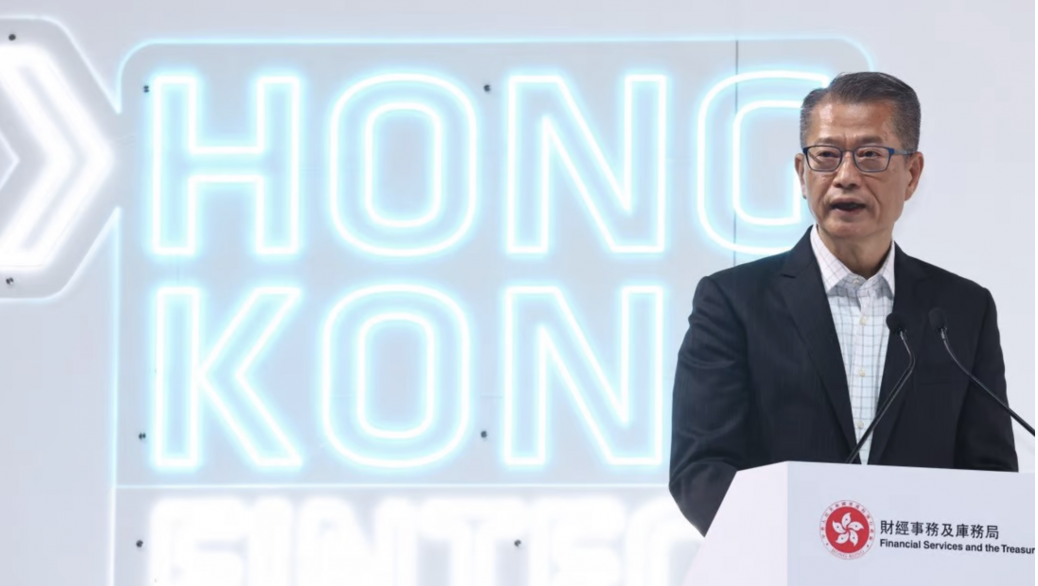Hong Kong’s Faster Payment System has surpassed 700,000 transactions a day in fintech milestone, says Financial Secretary Paul Chan
- Electronic payment system averaged HK$5.2 billion in transactions a day at the end of September, three years after its debut
- FPS is one of several ways Hong Kong seeks to innovate, Financial Secretary Paul Chan Mo-po says at 2021 Hong Kong FinTech Week conference
Hong Kong’s Faster Payment System (FPS) has surpassed 700,000 transactions a day just over three years after its debut, showcasing one of the ways the city is seeking to innovate as a financial technology hub, according to Financial Secretary Paul Chan Mo-po.
Speaking at the 2021 Hong Kong FinTech Week conference, Chan said the electronic system for immediate fund transfers and retail payments averaged 740,000 transactions per day worth HK$5.2 billion (US$668 million) at the end of September. Average daily transaction volumes have more than doubled from HK$2.4 billion in early 2020.
FPS, which debuted in September 2018, is one of several initiatives – from the recently launched Wealth Management Connect scheme in the Greater Bay Area (GBA) to an electronic consumption voucher scheme for residents – that the city has rolled out as it vies to remain at the cusp of innovation in the financial services sector, he said.
“Hong Kong remains a prime financial centre,” Chan said in the opening address at the conference on Tuesday.
By comparison, Singapore’s Fast and Secure Transfers (FAST) system averaged about 403,000 transactions a day worth S$578 million (US$428 million) in 2020, according to Monetary Authority of Singapore (MAS) data.
Octopus Cards Limited, the operator of the Octopus card system for transit and payments in Hong Kong, averaged 11.6 million transactions a day in 2020, with a daily transaction value exceeding HK$193.7 million, according to its annual report.
While the Octopus stored value facility (SVF) network has a higher number of daily transactions, a single Octopus card can only hold HK$3,000 at a time, after its limits were raised from HK$1,000 in April in conjunction with the city’s e-voucher programme.
Under the FPS system, a customer at HSBC, for example, can send up to HK$10,000 at a time using a QR code and up to HK$400,000 a day to selected merchants.
The city is also working on a commercial data interchange, first announced last year, that would allow a more secure and efficient flow of information between banks and providers of commercial data to facilitate trade financing and alternative credit scoring. The system is expected to go online next year, Chan said.
A consumption voucher scheme introduced this year to help spur the economy and support employment in sectors hit hard by the economic fallout of the coronavirus pandemic has helped fuel increased use of electronic payments by consumers and merchants.
The four stored-value facility operators taking part in the scheme – Alipay HK, Octopus, Tap and Go and WeChat Pay HK – have seen more than 3 million new consumer accounts and more than 80,000 new merchant accounts including taxi drivers and wet markets since its debut, Chan said. About 6.3 million residents have received the vouchers, he added.
At the same time, the introduction of Wealth Management Connect in October is a “watershed” moment for the financial development of the bay area, making it a destination of choice for financial technology companies looking to operate or expand, Chan said.
“The Hong Kong SAR government is actively working with mainland authorities to help the fintech industry seize the far-reaching opportunities,” he said. “These efforts are paying off.”
The scheme initially allows for a quota of 300 billion yuan (US$46.9 billion) in fund flows between Hong Kong and 10 cities in the bay area, marking a further opening up of the mainland’s financial system. Individual investors are limited to trading up to 1 million yuan on a net remittance basis.
However, the expectation is that the scheme could be a much larger contributor for banks and asset managers in the future as they seek to tap growing wealth in the region.
Another positive step for the development of cross-border financial services is a new one-stop sandbox platform recently announced by the Hong Kong Monetary Authority (HKMA) and the People’s Bank of China (PBOC).
It will allow start-ups to test their products in a controlled environment, while receiving more timely feedback from regulators and expediting the launch of financial products, Chan said.
Hong Kong is also testing the use of digital yuan, with the goal of creating more convenient correspondent payments between Hong Kong and mainland China residents, Chan said. The HKMA is studying the prospect of its own digital currency, the e-HKD, he said.
Source: South China Morning Post (3 Nov, 2021)






